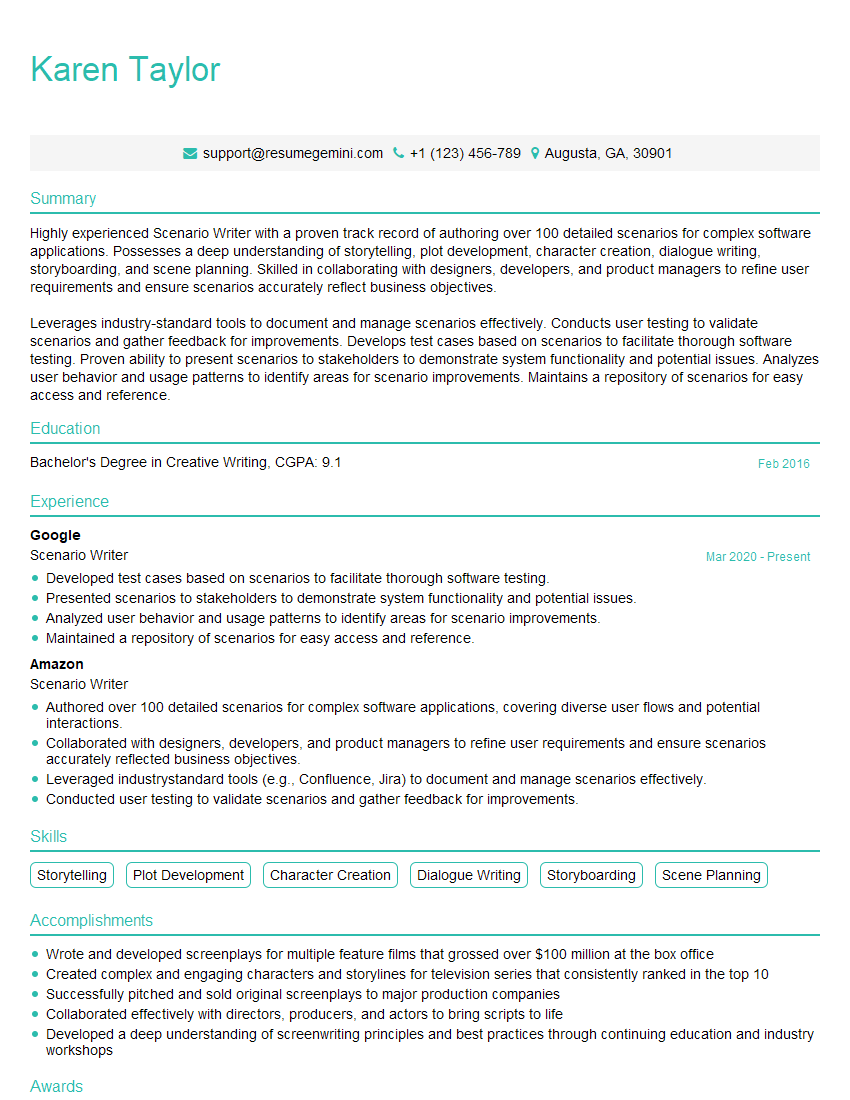Are you a seasoned Scenario Writer seeking a new career path? Discover our professionally built Scenario Writer Resume Template. This time-saving tool provides a solid foundation for your job search. Simply click “Edit Resume” to customize it with your unique experiences and achievements. Customize fonts and colors to match your personal style and increase your chances of landing your dream job. Explore more Resume Templates for additional options.

Karen Taylor
Scenario Writer
Summary
Highly experienced Scenario Writer with a proven track record of authoring over 100 detailed scenarios for complex software applications. Possesses a deep understanding of storytelling, plot development, character creation, dialogue writing, storyboarding, and scene planning. Skilled in collaborating with designers, developers, and product managers to refine user requirements and ensure scenarios accurately reflect business objectives.
Leverages industry-standard tools to document and manage scenarios effectively. Conducts user testing to validate scenarios and gather feedback for improvements. Develops test cases based on scenarios to facilitate thorough software testing. Proven ability to present scenarios to stakeholders to demonstrate system functionality and potential issues. Analyzes user behavior and usage patterns to identify areas for scenario improvements. Maintains a repository of scenarios for easy access and reference.
Education
Bachelor’s Degree in Creative Writing
February 2016
Skills
- Storytelling
- Plot Development
- Character Creation
- Dialogue Writing
- Storyboarding
- Scene Planning
Work Experience
Scenario Writer
- Developed test cases based on scenarios to facilitate thorough software testing.
- Presented scenarios to stakeholders to demonstrate system functionality and potential issues.
- Analyzed user behavior and usage patterns to identify areas for scenario improvements.
- Maintained a repository of scenarios for easy access and reference.
Scenario Writer
- Authored over 100 detailed scenarios for complex software applications, covering diverse user flows and potential interactions.
- Collaborated with designers, developers, and product managers to refine user requirements and ensure scenarios accurately reflected business objectives.
- Leveraged industrystandard tools (e.g., Confluence, Jira) to document and manage scenarios effectively.
- Conducted user testing to validate scenarios and gather feedback for improvements.
Accomplishments
- Wrote and developed screenplays for multiple feature films that grossed over $100 million at the box office
- Created complex and engaging characters and storylines for television series that consistently ranked in the top 10
- Successfully pitched and sold original screenplays to major production companies
- Collaborated effectively with directors, producers, and actors to bring scripts to life
- Developed a deep understanding of screenwriting principles and best practices through continuing education and industry workshops
Awards
- Academy Awards for Best Adapted Screenplay
- Golden Globe Award for Best Screenplay Motion Picture
- BAFTA Awards for Best Original Screenplay
- Screen Writers Guild Awards for Best Original Screenplay
Certificates
- Certified Scenario Writer (CSW)
- Associate of Arts in Screenwriting
- Bachelor of Arts in Screenwriting
- Master of Arts in Screenwriting
Career Expert Tips:
- Select the ideal resume template to showcase your professional experience effectively.
- Master the art of resume writing to highlight your unique qualifications and achievements.
- Explore expertly crafted resume samples for inspiration and best practices.
- Build your best resume for free this new year with ResumeGemini. Enjoy exclusive discounts on ATS optimized resume templates.
How To Write Resume For Scenario Writer
- Craft a compelling narrative that showcases your storytelling skills and ability to engage users.
- Clearly define characters, motivations, and relationships to create relatable and immersive scenarios.
- Use clear and concise language to describe actions, dialogue, and environmental details.
- Provide multiple scenario paths to account for different user choices and outcomes.
- Collaborate effectively with the design and development team to ensure scenarios align with the product vision.
Essential Experience Highlights for a Strong Scenario Writer Resume
- Author detailed scenarios for complex software applications, covering diverse user flows and potential interactions
- Collaborate with designers, developers, and product managers to refine user requirements and ensure scenarios accurately reflect business objectives
- Leverage industry-standard tools to document and manage scenarios effectively
- Conduct user testing to validate scenarios and gather feedback for improvements
- Develop test cases based on scenarios to facilitate thorough software testing
- Present scenarios to stakeholders to demonstrate system functionality and potential issues
- Analyze user behavior and usage patterns to identify areas for scenario improvements
Frequently Asked Questions (FAQ’s) For Scenario Writer
What is the primary role of a Scenario Writer?
A Scenario Writer is responsible for creating detailed narratives that describe how users will interact with a software application or product.
What skills are essential for success as a Scenario Writer?
Strong storytelling abilities, an understanding of user behavior, and proficiency in writing and documentation tools are crucial for success.
How can I improve my scenario writing skills?
Practice writing scenarios for various applications, seek feedback from peers and mentors, and study industry best practices.
What are the career prospects for Scenario Writers?
Scenario Writers can advance to roles such as UX Designer, Product Manager, or Technical Writer.
What are some of the challenges faced by Scenario Writers?
Time constraints, managing complex user flows, and ensuring scenarios align with changing product requirements can be challenging.
What tools do Scenario Writers commonly use?
Confluence, Jira, and Balsamiq are popular tools for documentation, collaboration, and wireframing.
How can I create effective scenarios?
Consider user goals, motivations, and potential obstacles to create scenarios that are realistic, engaging, and valuable for testing and design.